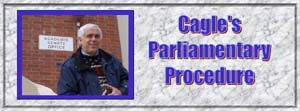
Link to Cagle's Questions page and index.
Link to Cagle's Parliamentary Procedure page.
Meeting Rules
I have a parliamentary procedure question regarding my fraternity. A question and debate was posted in an open forum of our chapter regarding the right of pledges to speak during chapter meetings. Our parliamentarian made a ruling on the matter at the request of the president and vice-president, and posted his ruling in the forum. Does this ruling stand if if was not made at a chapter meeting?
The group legally entitled to make a decision like that is the membership meeting and would do so via a motion. The bylaws for your fraternity should define the membership of a chapter meeting and if no qualifications are indicated all members would have all rights and privileges of membership, including the right to speak, make motions, vote, etc. You need to look at the bylaws closely.
In a meeting someone may raise a point of order on the matter of who has a right to vote. The chair would rule on the point of order (the parliamentarian cannot rule on anything and only gives advice). At this time a member can "appeal from the decision of the chair." The appeal must be seconded, is usually debatable, and requires a majority to pass. [The question is phrased, "Shall the decision of the chair be sustained?", so the appeal is won by defeating the motion.] Thus, the membership in voting on this question has the ultimate decision on a question.
The rules for a "forum" meeting are rather more open and your group determines those.
I hope these comments are helpful to you.
Proper Notice of Bylaw Amendments
This is a question concerning a sorority.
In our chapter we have an executive committee which consists of all elected officers and all committee chairpersons, some of whom are elected officers. Recently the constitution committee mailed proposed amendments to all members who had paid their dues by the January, 2002 meeting. copies of these amendments were not sent to members who had not yet paid.
The intention is to have votes on the proposed amendments at the February 2002 meeting. No communication was sent out to membership stating that amendments were to be presented and that if dues were not paid by January meeting a member would not be allowed to vote. There is nothing in our constitution that covers this.
My question is is this against parliamentary procedure or Robert's Rules of Order?As you describe it, it does sound illegal based on the principles in almost all parliamentary procedure manuals and, more importantly, on American parliamentary common law (i.e., law established over time as a result of court decisions).
All members have a right to vote on all matters unless there is an explicit bylaw provision that can suspend voting privileges (e.g., for not being in good
standing on dues). (Parliamentarians view bylaws and constitutions as equivalent, by the way.)
Without that bylaw provision, the members continue to have a legal right to be informed of all meetings, all proposed bylaw changes, etc.
Even if there is a bylaw provision that suspends voting rights, the members would continue to have the right to have a proper "call" to all meetings, to receive all advance materials before a meeting related to the agenda, etc., and to participate in debate at that meeting (unless the bylaw specifically removes such rights).
It is important to protect the rights of all members.
Good luck.
Return to Cagle's Questions page and index.
Link to Cagle's Parliamentary Procedure page.